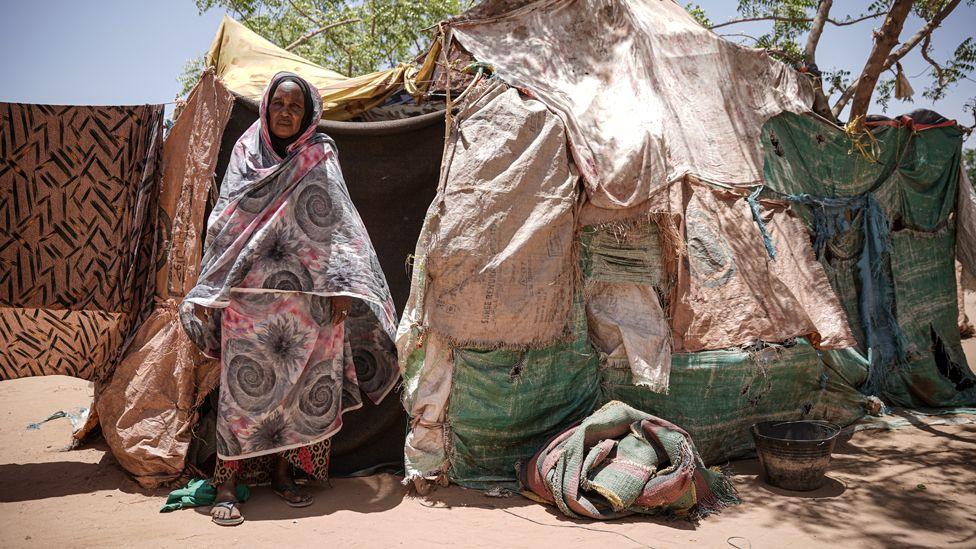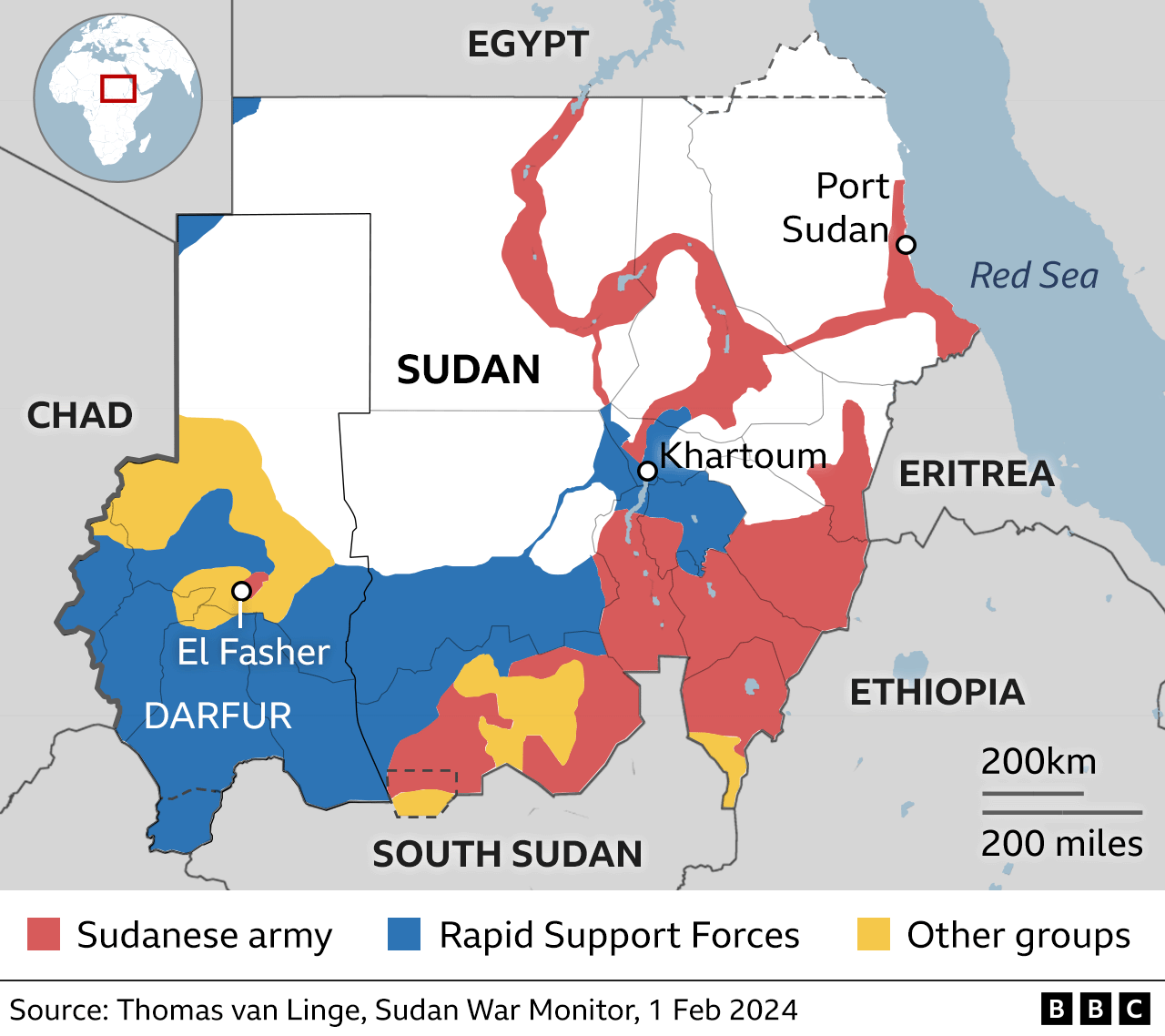Fear and prayers in Sudan city under siege

Fayza Ibrahim Osman is fearful of clashes inside El Fasher
- Published
The threat of invasion darkens the daily struggle for life in El Fasher, the main city in Sudan’s western Darfur region and the last major urban centre still under the army’s control.
“We all live in absolute fear and constant worry of what awaits us in the coming days,” says Osman Mohammed, a 31-year-old English teacher.
Mohammed Ali Adam Mohamed, a 36-year-old grocery shop owner with five children, has no doubt what a full-scale battle would mean.
“If clashes occur between the Rapid Support Forces (RSF) and the army inside the city, we civilians will be the victims,” he tells the BBC.
Sudan’s brutal civil war began just over a year ago, after the country’s two leading military men who had staged a coup together – one the head of the armed forces, the other the head of the RSF – fell out over the future of the country.
Until now El Fasher has been spared the worst of the violence and ethnic killings that have taken place across Darfur, the stronghold of the RSF.
But since the middle of last month, the paramilitary force has been besieging El Fasher, a humanitarian hub which hosts hundreds of thousands of displaced people, including those who have fled other areas seized by the group.
So far, bombardments and skirmishes have killed 43 people, according to the UN.
As people wait to see whether the RSF does launch a full-scale attack on the city, their focus is on a battle for survival.
Osman is engaged and should be preparing for a new life with his fiancée, but he is consumed instead with meeting his basic needs.
“Life is super difficult because of a lack of security, lack of cash flow and money in general,” he tells the BBC. “Everything is very expensive: food, water, transport, education and the list goes on.”
“The middle class has disappeared,” says Mohammed, “80% of citizens are now poor.”
He had to close his grocery shop early in the conflict when it was hit by stray bullets, and open a smaller one. But goods are in short supply and business has been crippled by price fluctuations and monopolies.
“Prices rise significantly whenever roads are closed,” he says.
Life is tremendously tragic for everyone in an indescribable way, economically, health-wise and psychologically”

There is no electricity and the shortage of water is acute, made more so by lack of fuel and increased demand from the influx of displaced people.
“The price of water is catastrophically high,” says Hussein Osman Adam, who picks up work as a taxi driver and food dealer when he can.
“Life is tremendously tragic for everyone in an indescribable way, economically, health-wise and psychologically.”
Hussein has diabetes, but supplies to test blood sugar levels have run out.
“Currently, we're just expecting anything,” he says.
The UN and US are anticipating the worst.
They have issued warnings about the consequences of a full-scale attack on an area already on the brink of famine.
It would be a “large-scale massacre… a disaster on top of a disaster,” the US ambassador to the UN, Linda Thomas-Greenfield, said earlier this week.
That prediction builds on what has been reported from other cities conquered by the RSF and allied Arab militias: widespread looting, ethnic violence against non-Arab groups and sexual attacks.
RSF commanders deny these accusations. They say they have a legitimate right to self-defence against army aggression and accuse the military of deliberately killing civilians with barrel bombs.
One of the reasons they have not been able to take El Fasher yet is because armed groups there have allied with the Sudan Armed Forces (SAF), chiefly rebels from the Zaghawa ethnic group who have vowed to inflict a decisive defeat on the RSF.
So, if war explodes in the besieged city, it is expected to be fierce and deadly.
“At this point, civilians and the SAF do not have a clear escape route,” said Nathaniel Raymond, executive director of the Humanitarian Research Lab at Yale’s School of Public Health.
“We call this phenomenon… a kill box,” he told a recent emergency media briefing, “and the space for intervention is probably gone.”
His researchers were seeing evidence, he said, that the army was preparing to fight a close-quarter battle “to the death”.
International medical charity Médecins Sans Frontières (MSF), which is on the ground, told the BBC it had so far treated 125 patients wounded in the fighting by military airstrikes and RSF shelling.
But for months it has been warning of a malnutrition crisis in the Zamzam camp south of El Fasher, home to many uprooted by previous waves of ethnic violence, that requires a massive increase in the humanitarian response.
The increased tensions have made that more difficult than it already was, says Claire Nicolet, head of MSF’s emergency response in Sudan, and an escalation in fighting would make it far worse.
The hardest thing now is the completely deteriorating mental state due to the repeated conflicts and constant tension"

Especially as recent months have seen people forced to flee surrounding areas surge into the city of El Fasher itself, where they are living in schools and areas known as gathering sites.
Fayza Ibrahim Osman is the women’s supervisor at one of them, the Tambasi Centre.
In a way she shares their story, having left her home in the northern part of the city. Life has become concentrated in the southern part of El Fasher because it is safer there, she says.
The centre has people with medical conditions for which they struggle to get medicine or treatment. But lack of food is the most pressing concern, with the Red Cross having stopped its delivery of two meals a day.
On Thursday the centre held a Quran recitation, she says, “praying to Allah to stop the war”.
“We fear rumours and hear gunfire from a distance,” she tells the BBC. “When planes come, we hear the sound of anti-aircraft guns. We are just afraid of clashes inside El Fasher.”
With all routes into and out of the city closed and unsafe, the claustrophobia of fear is oppressive.
“The hardest thing now is the completely deteriorating mental state due to the repeated conflicts and constant tension,” says Mohammed, the grocery shop owner.
The UN has warned that people are afraid of being killed should they attempt to flee, but really, MSF says, they have few places left to go.

More BBC stories on Sudan:

Go to BBCAfrica.com, external for more news from the African continent.
Follow us on Twitter @BBCAfrica, external, on Facebook at BBC Africa, external or on Instagram at bbcafrica, external